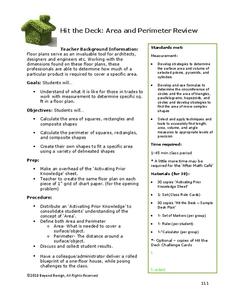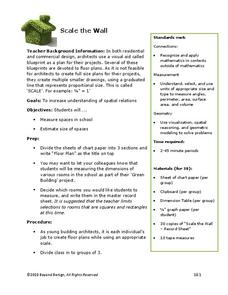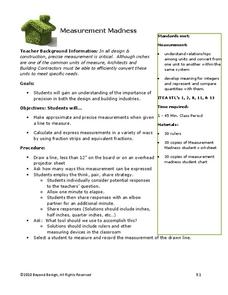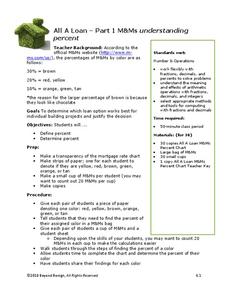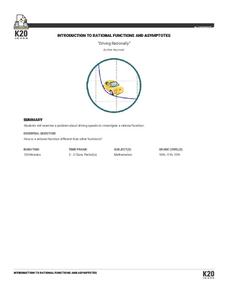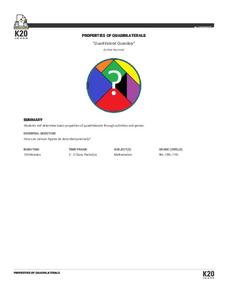K20 LEARN
Transformers Part 1 - Absolute Value and Quadratic Functions: Function Transformations
Transform your instruction with an exploratory instructional activity! Young scholars manipulate absolute values and quadratic functions to look for transformation patterns. They use the patterns to write general rules of transformations.
PBS
Reading Adventure Pack: Money
Money is the topic of a reading adventure pack. Third graders read two books—one fiction, one non-fiction—and complete a series of activities. Learners draw an item they wish to save money for, examine coins to start a collection, and...
Nebraska Department of Education
Managing My Money
Rent, food, utilities, gas, clothing, taxes! It all adds up. As part of a career planning and management unit, high school sophomores learn about financial planning and budgeting.
Beyond Benign
Build-A-Math
We can't build our dream house yet, but we can definitely build a model. Scholars use floor plans to build models of their dream homes. Cardboard is as good as any material for this purpose.
Beyond Benign
Final Budget
Be sure you have enough money to build a house. The 14th lesson plan in a 15-part series teaches young learners to use checkbook registers. They write checks for the amounts they spend on various housing materials and keep track of...
Beyond Benign
Green House?
A solid foundation is important for all things—especially houses. Learners research different materials for foundations based on environmental impact and cost. They decide whether concrete, insulated concrete, or wood would be best for...
Beyond Benign
Hit the Deck: Area and Perimeter Review
Designing a deck sure demands a lot of math. Future engineers and architects learn about the areas and perimeters of squares, rectangles, triangles, and composite figures. They apply their new knowledge to design a deck with a specified...
Beyond Benign
Decision Graphic Introduction
E is for economics, environment, and social equity. The fifth installment of a 15-part series has scholars first considering ecological impacts, such as determining how much water it takes to produce a can of soda. They then use decision...
Beyond Benign
Scale the Wall
How can you fit an entire school on one sheet of paper? You use scale! Scholars measure rooms in the school and, using the correct scale, design a floor plan that includes area calculations with their data.
Beyond Benign
Measurement Madness
Behind all good design and construction lies a perfect set of plans that are created by a person who knows his, or her, math! Youngsters practice using one of the key tools of the draftsman, the ruler, to practice measuring lines to the...
Beyond Benign
The Final Floor
Finally, the final floor plan. The 11th installment of a 15-part series looks at floor plans for houses. Scholars try their hand at creating a scale drawing for the floor plan of their dream houses.
Beyond Benign
All A Loan
When designing a house, it's important to know about percents. Through a series of three lessons, scholars first review percentages through an activity involving M&Ms and then apply that knowledge to calculate compound interest and...
Beyond Benign
Drafting Bubbles
Let's start designing a house. Future architects create floor plans for a house given certain constraints. They calculate the area of each room in the house. This is the 11th lesson in a 15-part unit.
Beyond Benign
House Project Overview
What does your perfect house look like? Pupils design a sustainable house given certain specifications. They create concept maps that detail the math skills they need to use while considering their designs.
Beyond Benign
Leave Only Footprints
You don't need to tip-toe around an enlightening resource. Young environmentalists learn about ecological footprints in the fourth lesson plan of 15. Answering a questionnaire helps them see how their own families and homes affect the...
K20 LEARN
Identity Theft: Don't Let This Happen to Your Grandma!
Class members consider how people steal online identities as they discover the essential elements of identity theft and consumer fraud. Pupils demonstrate learning by creating a poster or video about how to avoid identity theft.
K20 LEARN
Driving Rationally: Introduction To Rational Functions And Asymptotes
Calculating average speeds is not as simple as finding an average. The instructional activity introduces class members to rational functions by presenting a problem about finding an average speed for the rest of a trip. Pupils develop an...
K20 LEARN
Simply Elementary, Watson!
Explore the process of inductive and deductive reasoning. A collaborative lesson has some groups apply an inductive approach and others a deductive approach. Through class discussion, scholars compare their processes and discuss...
K20 LEARN
Do Placebos Kill Minotaurs?
But it's just a game! Learners play a game to learn basic concepts of statistical hypothesis testing. After using the digital-game module, pupils develop their own statistical hypotheses and test them.
K20 LEARN
Cumbersome Cubes
Halving is not always so simple. Small groups build a cube and then determine how to construct a cube that is half the size. Groups create two cubes, one that is the correct size and another that would be an alternative solution. To...
K20 LEARN
Are We Golden?
Lead your class on a search for precious bones. Using a presentation, the class investigates the golden ratio in art and nature. Groups of pupils measure specific bones and find the average ratio for the class. To further cement the...
K20 LEARN
Prime Time
How many prime numbers are there between 1 and 100? By using a prime time resource, your scholars should be able to answer this question. Using arrays, they determine if numbers are prime or composite, and then write a prime...
K20 LEARN
Quadrilateral Quandary
Classify quadrilaterals quickly. After playing a game to identify quadrilaterals, your young scholars should come away with knowledge of the properties of quadrilaterals. They then apply this knowledge to create a decision tree to ease...
K20 LEARN
Round and Round We Go
Connect the dots on trigonometry with K'nex. Scholars use a K'nex model of a Ferris wheel to collect data points to plot on a height versus time graph. They'll then consider what type of function best models the data in the graph—and...








